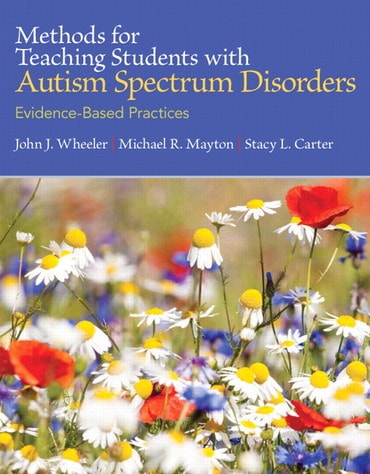
Methods for Teaching Students with Autism Spectrum Disorders: Evidence-Based Practices, 1st edition
- John J. Wheeler |
- Michael R. Mayton |
- Stacy L. Carter |
Title overview
- The emphasis is on the theme of family and professional partnerships, collaboration and consultation, and the diverse characteristics and needs of students with ASD:
- Students are inspired to become highly skilled and knowledgeable of the importance of family partnerships in the education and treatment of learners with ASD, as well as the challenges and solutions for including students with marked differences in behavior, sensory needs, and communication ability.
- Helpful pedagogical aids pull readers into the content:
- Teaching aids such as suggested print and web-based resources, graphic organizers, and points for reflection guide readers through the text and promote retention of key information and strategies.
- Illustrative features bring meaning to sometimes-difficult concepts
- Child and family vignettes show the concepts in real-life contexts and can be use as lead-ins to engaging class discussions.
- “Consider This” features in each chapter help students pause and reflect on how to apply the implications of the principles to everyday practice.
- Exemplary programs and practices are illustrated in each chapter to give students a broader perspective on where cutting edge practices are used and encourage students to incorporate these strategies into their teaching repertoire.
- The most up-to-date information in the field of evidence-based practices is provided in every chapter.
Table of contents
Brief Contents
Section I: Introduction
- Chapter 1 Understanding Autism Spectrum Disorders Across the Lifespan
- Chapter 2 Determining Evidence-Based Interventions
Section II: Early Childhood
- Chapter 3 Identification and Early Intervention
- Chapter 4 Teaming with Families
- Chapter 5 Teaching Communication Skills
- Chapter 6 Methods for Promoting Social Competence
Section III: The School Years
- Chapter 7 Building School-Based Behavioral Repertoires
- Chapter 8 Collaboration and Consultation
- Chapter 9 Developing Academic Skills
Section IV: Moving from School to Adult Life
- Chapter 10 Fostering Self-Determination
- Chapter 11 Transition to Adulthood
- Chapter 12 Enhancing Quality of Life
Author bios
Dr. John Wheeler currently serves as Director of the Center of Excellence in Early Childhood Learning and Development and Professor of Special Education at East Tennessee State University. He has had over twenty-five years of experience in working with children with autism spectrum disorders and their families throughout his career in special education. He has authored/co-authored numerous research studies in the education and treatment of children with ASD and serves on a number of editorial boards for professional journals in the field. Most recently he and his co-author David Dean Richey have completed the third edition of their text entitled Behavior Management: Principles and Practices of Positive Behavior Supports also published by Pearson.
Michael R. Mayton, Ph.D., BCBA-D is an Assistant Professor of Special Education at West Virginia University where he teaches courses in applied behavior analysis for teachers and supervises the graduate certification program in autism. He is a Board Certified Behavior Analyst who has worked with children in public schools and adults with developmental disabilities in community settings. He has had the honor of being the founding director of the Kelly Autism Program in Bowling Green, Kentucky and providing a range of workshop supports to educators on topics such as identifying and teaching positive replacement behaviors, reducing aggression in young adults with autism, and antecedent management for students with developmental disabilities. His research interests include evidence-based practice assessment and development for people with autism, professional development in special education, and intrusiveness of behavioral treatments for students and adults with disabilities.
Dr. Stacy Carter is an Associate Professor in the Special Education Program at Texas Tech University where he coordinates the Graduate Certificate Program in Applied Behavior Analysis. Dr. Carter is a Board Certified Behavior Analyst, a Nationally Certified School Psychologist, and a licensed special education teacher. He has over fifteen years of experience working with individuals with autism spectrum disorders in developmental centers, psychiatric hospitals, community living situations, and school settings. His research has focused on the development and evaluation of behavior intervention programs for individuals with developmental disabilities and autism. He has published numerous peer reviewed journal articles, book chapters, and a scholarly reference book on social validity.